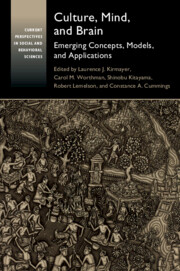Book contents
- Culture, Mind, and Brain
- Current Perspectives in Social and Behavioral Sciences
- Culture, Mind, and Brain
- Copyright page
- Dedication
- Epigraph
- Contents
- Figures
- Tables
- Contributors
- Preface
- Abbreviations
- 1 Introduction
- Part I Dynamics of Culture, Mind, and Brain
- Part II Applications
- 12 The Cultural Brain as Historical Artifact
- 13 Experience-Dependent Plasticity in the Hippocampus
- 14 Liminal Brains in Uncertain Futures
- 15 The Reward of Musical Emotions and Expectations
- 16 Literary Analysis and Weak Theories
- 17 Capturing Context Is Not Enough
- 18 Social Neuroscience in Global Mental Health
- 19 Cities, Psychosis, and Social Defeat
- 20 Internet Sociality
- 21 Neurodiversity as a Conceptual Lens and Topic of Cross-Cultural Study
- 22 Epilogue
- Index
- References
21 - Neurodiversity as a Conceptual Lens and Topic of Cross-Cultural Study
from Part II - Applications
Published online by Cambridge University Press: 18 September 2020
- Culture, Mind, and Brain
- Current Perspectives in Social and Behavioral Sciences
- Culture, Mind, and Brain
- Copyright page
- Dedication
- Epigraph
- Contents
- Figures
- Tables
- Contributors
- Preface
- Abbreviations
- 1 Introduction
- Part I Dynamics of Culture, Mind, and Brain
- Part II Applications
- 12 The Cultural Brain as Historical Artifact
- 13 Experience-Dependent Plasticity in the Hippocampus
- 14 Liminal Brains in Uncertain Futures
- 15 The Reward of Musical Emotions and Expectations
- 16 Literary Analysis and Weak Theories
- 17 Capturing Context Is Not Enough
- 18 Social Neuroscience in Global Mental Health
- 19 Cities, Psychosis, and Social Defeat
- 20 Internet Sociality
- 21 Neurodiversity as a Conceptual Lens and Topic of Cross-Cultural Study
- 22 Epilogue
- Index
- References
Summary
The neurodiversity movement argues that certain diagnoses implicating the brain, most notably autism, do not reflect neurological disorders but rather neurological diversity. Neurodiversity movements lie at the intersection of culture, mind, and brain as mind/brain discourses are taken up as cultural practice used in individual and collective identity formation as well as social and political action. Neurodiversity perspectives intersect with important considerations in bioethics, particularly around questions of respect and justice for autistic people. This chapter describes neurodiversity and related concepts, discusses the way neurodiversity can inform bioethics as a conceptual lens, and summarizes cross-cultural research on neurodiversity movements that can help address neurodiversity-informed bioethics questions. It concludes with proposed directions for future research.
- Type
- Chapter
- Information
- Culture, Mind, and BrainEmerging Concepts, Models, and Applications, pp. 477 - 493Publisher: Cambridge University PressPrint publication year: 2020

